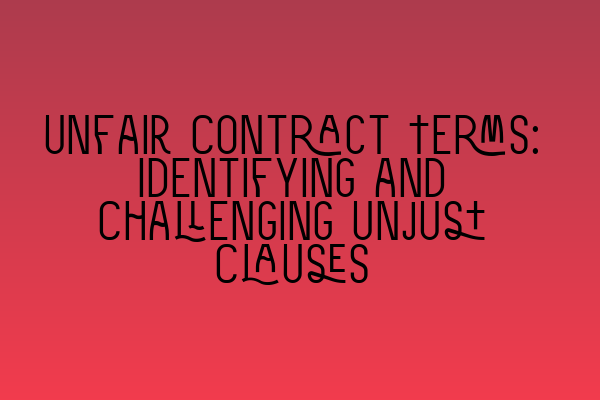Unfair Contract Terms: Identifying and Challenging Unjust Clauses
As a legal professional, it is essential to understand the concept of unfair contract terms and how they can impact clients and their rights. Unjust clauses can often be hidden within contracts, leaving individuals vulnerable and unaware of the potential risks they may be taking on. In this blog post, we will delve into the topic of unfair contract terms, discuss how to identify them, and explore strategies for challenging such clauses.
Identifying Unfair Contract Terms:
Before delving into challenging unjust clauses, it is important to be able to identify them in the first place. Unfair contract terms can come in various forms, but they generally fall into one of the following categories:
1. Exclusion or limitation of liability: These clauses seek to exempt one party from their legal responsibilities or limit the amount of liability they can incur. For example, a contract may attempt to absolve a business from any responsibility for damages caused by their products or services.
2. Unreasonable cancellation or termination clauses: These clauses give one party the power to unilaterally cancel or terminate the contract without providing a reasonable justification or adequate notice. They often leave the other party in a vulnerable position, with little recourse for compensation or negotiation.
3. Unbalanced allocation of risk: A contract should ideally distribute risk fairly between the parties involved. However, some contracts may disproportionately place the burden of risk on one party without a justifiable reason.
4. Unconscionability: This refers to a contract or clause that is so unfair or one-sided that it shocks the conscience. These clauses generally exploit a power imbalance between the parties and can be deemed unenforceable by a court of law.
Challenging Unjust Clauses:
Once you have identified unfair contract terms, it is important to advise your clients on their options for challenging such clauses. Here are a few strategies that can be employed:
1. Review the contract carefully: Thoroughly examine the terms and conditions of the contract to identify any potentially unfair clauses. Pay attention to any clauses that seem one-sided, unclear, or overly burdensome.
2. Assess the legality and enforceability: Determine whether the unfair clause is contrary to applicable laws and regulations. Certain jurisdictions have specific statutes that protect consumers or prohibit certain types of unfair contract terms. Consider consulting with an experienced solicitor to ensure a comprehensive analysis.
3. Engage in negotiation: If you believe a clause is unfair, consider discussing the matter with the other party and attempting to negotiate a fairer arrangement. Often, parties are open to reasonable discussions and may be willing to amend or remove unfair clauses.
4. Seek legal advice: If negotiation fails or you require further guidance, it is crucial to seek advice from a solicitor who specializes in contract law. They can help assess the strength of your case and provide options for challenging the unfair clause.
5. Alternative Dispute Resolution (ADR): In some cases, resolving issues through mediation or arbitration may be a viable option. A trained mediator can help facilitate a fair and amicable resolution, ensuring both parties’ concerns are addressed.
It is essential for legal professionals to stay updated on recent cases and legal developments in the field of contract law. This knowledge can help in identifying new types of unfair contract terms and reinforce your ability to challenge them effectively. Participating in SQE 1 Practice Exam Questions and SQE 1 Practice Mocks FLK1 FLK2 can be valuable resources for keeping your legal knowledge sharp.
Conclusion:
Unfair contract terms can often go unnoticed, leaving individuals at a significant disadvantage. Identifying and challenging unjust clauses is an integral part of advocating for clients and ensuring fairness in contractual agreements. By carefully reviewing contracts, assessing legality and enforceability, engaging in negotiation, seeking legal advice, and considering alternative dispute resolution methods, legal professionals can effectively tackle unfair terms. As SQE Contract Law solicitors, staying informed through SQE 1 Preparation Courses and SQE 2 Preparation Courses is crucial to providing the best possible advice to clients. Remember, being proactive and vigilant can make a significant difference in protecting your clients’ rights and interests.
To learn more about SRA SQE Exam Dates and stay up to date with the latest developments in the legal profession, please visit the links provided.
